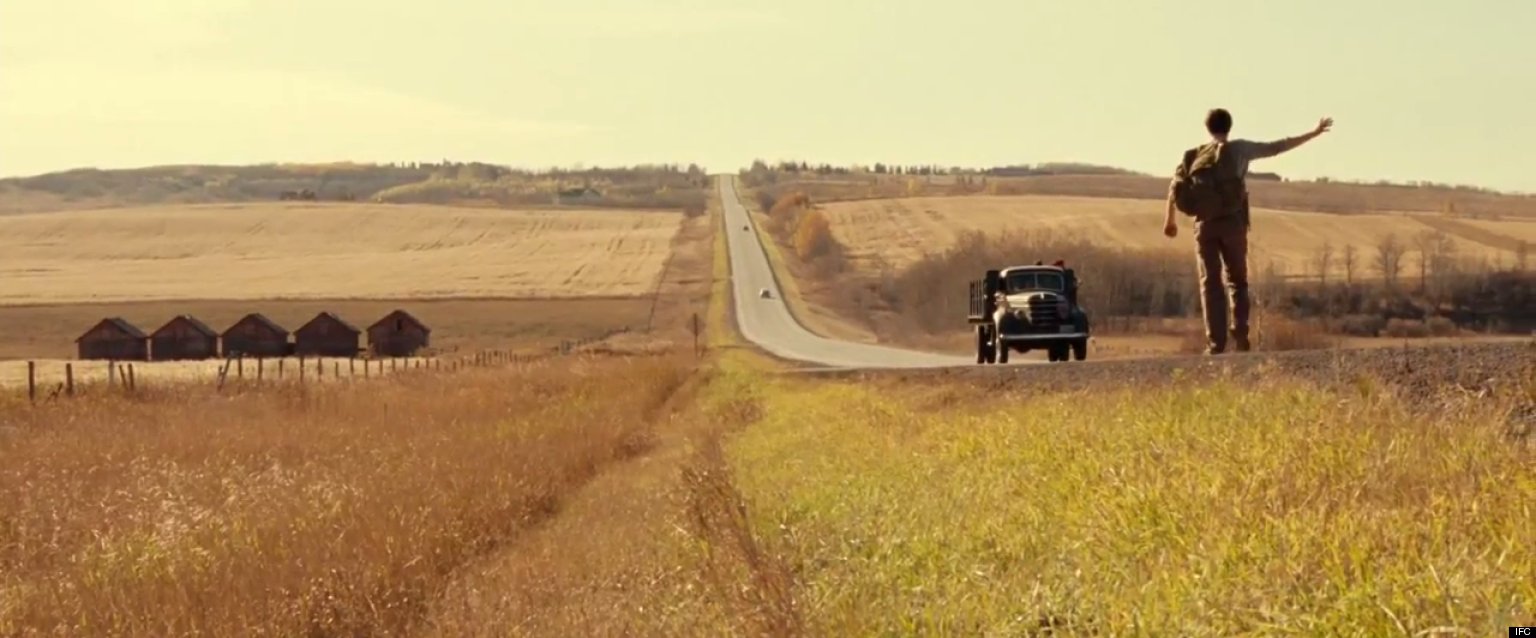Having read Jack Kerouac’s 1957 classic On the Road, I am fascinated by the idea of the “road trip.” To just go-despite being “so lonely, so sad, so tired, so quivering, so broken, so beat”-represents absolute freedom and complete agency.

Road trips have come to be an essential part of American society. The romanticized notion is best captured in Jack Kerouac’s book, “On the Road.” (image credit: 2010 movie “On the Road”)
The advent of automobiles in the 1950s, combined with highway expansion (the Interstate Highway System was created by the Federal Aid Highway Act of 1956) and cheap gas prices ($0.60 per gallon), strengthened accessibility and mobility throughout the country. Driving, or road trips, became synonymous with the American identity.
John Steinbeck declares in Travels with Charley: In Search of America that Americans hunger to move: “I saw in their eyes something I was to see over and over in every part of the nation-a burning desire to go, to move, to get under way, anyplace, away from any Here.”
This past Saturday, at La Jolla Playhouse, a road trip took place. The road-less-travelled kind, that of a Latina mother (Beatriz) and her 16-year-old daughter (Olivia).

“Miss You Like Hell” takes a complicated mother/daughter story and brings that relationship on the road, literally traveling from Philadelphia to Los Angeles. (Image Credit: La Jolla Playhouse/UCSD)
“Miss You Like Hell,” a new musical written by playwright Quiara Alergría Hudes, a 2012 Pulitzer Prize for Drama winner, delves into what it means to be an “American” family.
Obie Award (or Off-Broadway Theatre Award) winner Lear deBessonet is the director and singer/songwriter Erin McKeon composer/co-lyricist.
The journey began with Beatriz asking her daughter to take a road trip with her. From the start, Beatriz defies established notions associated with her identity. She should be driving a family van, yet she arrives at Olivia’s doorstep in a monster truck. She is a mother, yet she is a free spirited, spontaneous wild child.
She is not your typical, nurturing mother. Beatriz left her daughter at 12, after losing her daughter’s custody battle. But despite Olivia harboring resentment toward her mother-”You didn’t fight for me”, Olivia agreed to go. The mother/daughter duo proceeded to drive 3,000 miles from Philadelphia to Los Angeles. Along the way, they encountered a medley of characters, including homosexual couple Mo and Higgins, a tamale seller Manuel and a Yellowstone ranger Pearl. Theses characters played a part in bringing the estranged mother and daughter closer, resulting in Olivia eventually agreeing to stand as witness in her mother’s naturalization hearing in Los Angeles.
The road, a space of travel, transition and transformation, is ultimately where Olivia came to accept her Mexican heritage and her mother’s story are part of her American identity.
The road trip is a fundamental symbol of American identity. Yet, as Gabriel Greene, La Jolla Playhouse’s director of new play development notes in her Q&A with playwright Hudes, the American road trip has been historically associated with men.
The road is one of the most fundamental American symbols; it’s the promise of expansion, of finding meaning; the promise of un-attachment and discovery… Even in 2016, for all of the headway that feminism has given to [women], there’s still a sense of domesticity attached to womanhood… Woman can’t own the road on their own terms.
It is deliciously subversive for Beatriz to take part in the “American” road trip, because on top of her sex, she is also not legally an American citizen.
===
While I applaud La Jolla Playhouse for commissioning a work that addresses challenging issues facing our nation, I find the central storyline lacking. The musical tried to tackle too many problems, including immigration, same sex marriage, depression, suicide, feminism… in just two acts. Instead of building on and harnessing the emotional intensity of the central plot, that of a broken mother/daughter team driving to Los Angeles for a court hearing, I found my attention being pulled here and there during the performance. For one, there was the homosexual couple who celebrated their anniversary with a road trip of their own, renewing their wedding vows in all 50 states. Then, there was a tamales seller who was all about the memory and cultural lineage that comes with preparing foods together as a family in one kitchen. Amongst this backdrop, there was even a turtle.
A turtle?
The incident involved Olivia, who despite her best intention not to run over a turtle in Yellowstone, crashed the truck into a tree and killed the turtle anyway. Issues highlighted included merciful killing, death, and also how bad things happen in life in spite of best intentions.
I mentioned my observation to a friend, and he pointed out the musical “went down like a protest.” The central message gets diluted as the initial protestors attempt to march on while other protestors join the fight with their own agenda and slogan.
Kudos to the effort, and hopefully a better protest next time.
“Miss You Like Hell”
La Jolla Playhouse
October 25 -December 4, 2016
